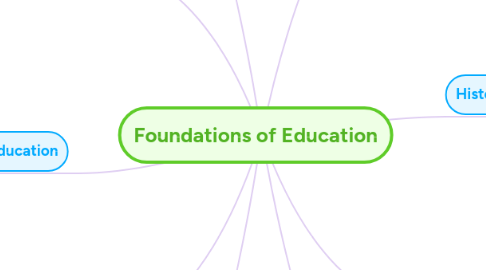
1. Educational Inequality
1.1. Unequal educational achievement
1.1.1. Functionalist
1.1.1.1. hard work and desire
1.1.2. Conflict
1.1.2.1. environment
1.1.3. Interactionist
1.1.3.1. family, social class, environment
1.2. Schools reproduce inequality
1.2.1. Cliques
1.2.2. Popularity
1.2.3. Favorites
2. Politics of Education
2.1. Conservative
2.1.1. Teacher-Centered
2.1.2. Structured
2.1.3. Maturity
2.2. Liberal
2.3. Radical
2.3.1. Included
2.3.2. Included
2.3.3. Excluded
2.4. Neo-Liberal
2.5. Traditional vision of Education
2.6. Progressivism vision of Education
3. Philosophy of Education
3.1. Teacher-Centered
3.1.1. Essentialism
3.1.1.1. Focus on academics
3.1.1.2. Individual work
3.1.2. Perenialism
3.1.2.1. Focus on classic ideas
3.2. Student-Centered
3.2.1. Progressivism
3.2.1.1. Learning from experience
3.2.2. Existentialism
3.2.2.1. Why are we here?
4. •Equality of Opportunity
4.1. Middle/Upper class
4.1.1. Represented by schools
4.1.2. Achievement Gap
4.1.2.1. parental income
4.2. Attainment gap
4.2.1. college graduates
4.2.2. more chances
4.3. Race inequality
4.3.1. Minorities
4.3.1.1. Less opportunity
4.3.2. Less opportunity
4.4. Coleman study
4.4.1. Higher expectations
4.4.1.1. Better results
4.4.2. Better results
5. Schools as Organizations
5.1. Openness
5.1.1. Education available to all
5.1.2. Accountability of Education Act
5.1.2.1. Passed in 2013
5.1.2.2. $ from public to private fund
5.2. Social Aspects
5.2.1. Conflicts
5.2.1.1. Teachers and students
5.2.1.2. Teachers and administration
5.2.1.3. Administration and community
5.2.1.4. Necessary for change
6. •Curriculum and Pedagogy
6.1. Conservatist
6.1.1. Core classes
6.2. Sociological
6.2.1. Informal
6.2.2. Formal
6.2.3. Null
7. History of U.S. Education
7.1. Old Deluder Laws
7.1.1. 1642
7.1.2. Purpose
7.1.2.1. to read
7.2. Public Schools
7.2.1. Boys only
7.3. Meritocracy
7.3.1. Thomas Jefferson
7.3.2. Right to a public educaiton
7.3.3. Reward students by merit
7.4. Utilitarianism
7.4.1. Benjamin Franklin
7.4.2. Vocational school
8. Sociology Perspectives
8.1. Define Project Schedule
8.1.1. Dependencies
8.1.2. Milestones
8.2. Limitations
8.2.1. Schedule
8.2.2. Budget
8.3. Define Project Development Measurement
8.3.1. KPI's
9. •Educational Reform and School Improvement
9.1. Highly effective teachers
9.1.1. a "calling"
9.1.2. Instructional effectivenesse
9.1.3. Lifelong learner
9.2. Federal Involvement
9.2.1. No child left behind
9.2.2. Race to the top
9.3. School based reform
9.3.1. Charter schools
9.3.2. Tuition vouchers
